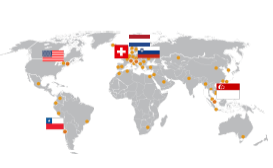One of the main features of the CAREN system is that is allows users to collect gait data in challenging conditions, for example on a simulated hill or uneven path. This is nicely illustrated in a recent study from The Ottawa Hospital Rehabilitation Centre, where a group of ten individuals with a unilateral transfemoral amputation (TFA) and a group of ten individuals without amputation walked on the CAREN-Extended. During the trials, participants walked on different challenging surfaces including uphill and downhill slopes, rolling hills and simulated rocky path. The different conditions were simulated with a combination of platform movements and the immersive virtual reality environment. Participants walked at self-paced walking speed using the built-in algorithm of the CAREN for self-paced walking on a treadmill, which allows for natural variations in walking speed. Adaptations were seen in the gait pattern in individuals both with and without TFA during non-level conditions. Individuals with TFA walked slower and with wider steps than individuals without. Gait variability was increased in both groups while walking on the non-level surfaces. The researchers conclude that the results from this study could help to develop training programs for people with TFA to improve their walking ability on challenging surfaces.
Check out the full article here: Sturk J.A. et al. (2017) Disability and Rehabiliation: Assistive Technology


